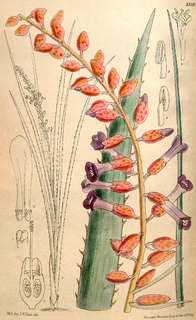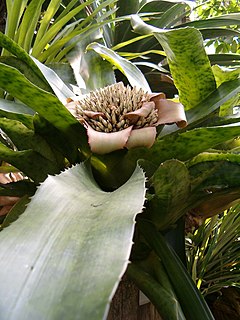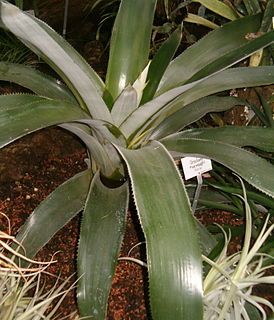Related Research Articles

Canistrum is a genus of plants in the family Bromeliaceae, subfamily Bromelioideae.

Cryptanthus is a genus of flowering plants in the family Bromeliaceae, subfamily Bromelioideae. The genus name is from the Greek cryptos (hidden) and anthos (flower). This genus has two recognized subgenera: the type subgenus and HoplocryptanthusMez. All species of this genus are endemic to Brazil. The common name for any Cryptanthus is "Earth star".

Deuterocohnia is a genus of plants in the family Bromeliaceae, subfamily Pitcairnioideae, endemic to South America. The genus is named for Ferdinand Julius Cohn, Jewish botanist and bacteriologist.

Orthophytum is a genus in the plant family Bromeliaceae, subfamily Bromelioideae.

Fascicularia is a genus of flowering plants in the pineapple family Bromeliaceae, subfamily Bromelioideae. The genus name is from the Latin fasciculus (bundle) and arius.

Glomeropitcarnia is a genus of the botanical family Bromeliaceae, subfamily Tillandsioideae. The genus name is from the Latin “glomero” and the genus Pitcairnia. It has two known species, native to Venezuela, Trinidad and the Lesser Antilles.

Greigia is a genus of plants in the family Bromeliaceae, subfamily Bromelioideae. It is native to Latin America from Mexico to Chile. The genus is named in honour of Major General Samuel Alexjewitsch Greig, president of the Russian Horticultural Society in 1865.

Mezobromelia is a genus of the botanical family Bromeliaceae, subfamily Tillandsioideae. The genus name is for Carl Christian Mez, German botanist (1866-1944).

Neoglaziovia is a genus in the plant family Bromeliaceae, subfamily Bromelioideae.

Edmundoa is a genus of plants in the family Bromeliaceae, subfamily Bromelioideae. The genus is named for Edmundo Pereira, Brazilian botanist (1914–1986) and has only recently been recognized as an independent genus, grouped earlier with Canistrum.

Ronnbergia is a genus in the plant family Bromeliaceae, subfamily Bromelioideae. Native to South and Central America, this genus was named for Auguste Ronnberg, Belgian Director of Agriculture and Horticulture in 1874.

Alcantarea is related to the genus Vriesea of the botanical family Bromeliaceae, subfamily Tillandsioideae.
Deinacanthon is a genus of the botanical family Bromeliaceae, subfamily Bromelioideae. The genus name is from the Greek “deinos” - terrible and “anthos” - flower.

Ursulaea is a genus in the plant family Bromeliaceae, subfamily Bromelioideae. Represented by two known species, these plants are endemic to Mexico.

Guzmania lingulata, the droophead tufted airplant or scarlet star, is a species of flowering plant in the family Bromeliaceae, subfamily Tillandsioideae, native to rainforest habitats in Central America, northern and central South America and southern Mexico. It is an evergreen epiphytic perennial. The Latin word lingulata means "tongue-shaped". Foliage grows in a star-shaped basal rosette which culminates in an orange and red bracted inflorescence. It is among the most commonly cultivated bromeliad types, with cultivars producing flowers in shades of maroon, red, orange, yellow or pink.
Pitcairnia venezuelana is a plant species in the genus Pitcairnia. This species is endemic to Venezuela.

Tillandsia utriculata, commonly known as the spreading airplant or the giant airplant, is a species of bromeliad that is native to Florida and Georgia in the United States, the Caribbean, southern and eastern Mexico, Central America, and Venezuela.

Guzmania musaica is a plant species in the genus Guzmania. This species is native to Costa Rica, Panama, Ecuador, Venezuela and Colombia.

Dyckia milagrensis is a plant species of the genus Dyckia, native to Bahia, Brazil.

Dyckia tobatiensis is a plant species of the genus Dyckia, native to Paraguay.
References
- ↑ "FCBS Bromeliad Photo Index Database: Search Results". FCBS Bromeliad Photo Index Database. Florida Council of Bromeliad Societies. Retrieved 16 November 2020.CS1 maint: discouraged parameter (link)